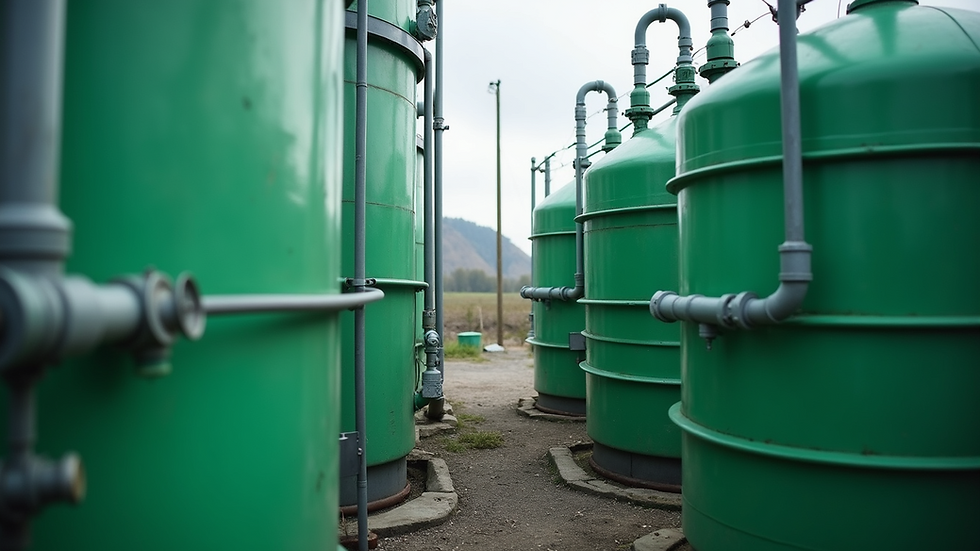Harnessing Renewable Natural Gas for a Greener Future
- sid0194
- Sep 27
- 4 min read
In a world increasingly aware of climate change and environmental issues, the search for sustainable energy sources has never been more urgent. One promising solution is renewable natural gas (RNG). This clean energy source can help reduce greenhouse gas emissions and provide a reliable energy supply. In this blog post, we will explore what renewable natural gas is, how it is produced, its benefits, and its potential role in creating a greener future.
What is Renewable Natural Gas?
Renewable natural gas is a type of biogas that is produced from organic materials. Unlike conventional natural gas, which is extracted from fossil fuels, RNG is created through the decomposition of organic matter. This can include agricultural waste, food scraps, and even wastewater.
RNG is chemically similar to conventional natural gas, primarily composed of methane. However, its production process is much more sustainable. By capturing methane emissions from organic waste, RNG helps to reduce the overall carbon footprint of energy consumption.
How is Renewable Natural Gas Produced?
The production of renewable natural gas involves several steps. Here’s a simplified overview of the process:
Feedstock Collection: Organic materials are collected from various sources, such as farms, landfills, and wastewater treatment plants.
Anaerobic Digestion: The collected organic matter is placed in an anaerobic digester, where microorganisms break it down in the absence of oxygen. This process produces biogas, which contains methane and carbon dioxide.
Purification: The biogas is then purified to remove impurities and carbon dioxide, resulting in renewable natural gas.
Injection into the Grid: Once purified, RNG can be injected into existing natural gas pipelines or used on-site for heating, electricity generation, or as a vehicle fuel.
This process not only generates energy but also helps manage waste, making it a win-win solution for both energy production and environmental sustainability.
Benefits of Renewable Natural Gas
Renewable natural gas offers several advantages that make it an attractive option for a sustainable energy future. Here are some key benefits:
Reduces Greenhouse Gas Emissions: By capturing methane that would otherwise be released into the atmosphere, RNG significantly lowers greenhouse gas emissions.
Utilizes Waste: RNG production helps to divert organic waste from landfills, reducing waste management issues and promoting a circular economy.
Energy Security: RNG can be produced locally, reducing dependence on imported fossil fuels and enhancing energy security.
Compatibility with Existing Infrastructure: Since RNG is chemically similar to conventional natural gas, it can be easily integrated into existing natural gas pipelines and infrastructure.
Job Creation: The RNG industry has the potential to create jobs in various sectors, including agriculture, waste management, and energy production.
These benefits highlight the potential of renewable natural gas as a key player in the transition to a more sustainable energy system.
Real-World Examples of Renewable Natural Gas Projects
Several successful RNG projects around the world demonstrate the viability and effectiveness of this clean energy source. Here are a few notable examples:
California's RNG Initiatives: California has been a leader in RNG production, with numerous projects converting organic waste into renewable natural gas. The state has set ambitious goals for reducing greenhouse gas emissions, and RNG plays a crucial role in achieving these targets.
Sweden's Biogas Production: Sweden has invested heavily in biogas production from organic waste. The country has developed a robust infrastructure for collecting and processing organic materials, resulting in a significant increase in renewable natural gas production.
Europe's Landfill Gas Projects: Many European countries have implemented projects to capture landfill gas and convert it into renewable natural gas. These initiatives not only reduce emissions but also provide a valuable energy source.
These examples illustrate how renewable natural gas can be effectively harnessed to address environmental challenges while providing a reliable energy supply.
The Future of Renewable Natural Gas
As the world continues to grapple with climate change, the demand for clean energy sources will only grow. Renewable natural gas has the potential to play a significant role in this transition. However, several challenges must be addressed to fully realize its potential.
Policy Support
Government policies and incentives are crucial for promoting the development of RNG projects. Supportive regulations can encourage investment in renewable natural gas infrastructure and technology.
Public Awareness
Increasing public awareness about the benefits of renewable natural gas is essential. Educating consumers about the importance of sustainable energy sources can drive demand and support for RNG initiatives.
Technological Advancements
Continued research and development in RNG production technologies can improve efficiency and reduce costs. Innovations in anaerobic digestion and purification processes will be key to scaling up RNG production.
Collaboration
Collaboration between various stakeholders, including governments, businesses, and communities, is vital for the successful implementation of renewable natural gas projects. Partnerships can help share knowledge, resources, and best practices.
By addressing these challenges, renewable natural gas can become a cornerstone of a sustainable energy future.
How You Can Get Involved
Individuals and communities can play a role in promoting renewable natural gas. Here are some ways to get involved:
Support Local Initiatives: Look for local RNG projects and support them through advocacy or participation.
Educate Others: Share information about renewable natural gas with friends, family, and your community. Raising awareness can help build support for sustainable energy solutions.
Reduce Organic Waste: Practice waste reduction and composting at home. By minimizing organic waste, you contribute to a more sustainable future.
Advocate for Policy Change: Engage with local policymakers to advocate for supportive regulations and incentives for renewable natural gas projects.
Every small action can contribute to a larger movement toward a greener future.
A Greener Tomorrow Awaits
Renewable natural gas represents a promising solution to some of the most pressing environmental challenges we face today. By harnessing the power of organic waste, we can reduce greenhouse gas emissions, promote energy security, and create a more sustainable energy system.
As we look to the future, it is essential to support and invest in renewable natural gas initiatives. Together, we can pave the way for a cleaner, greener tomorrow.



Comments